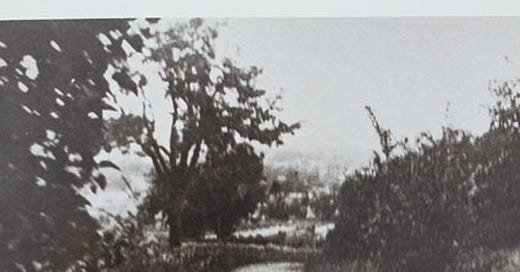Photograph of Woman Who Fell off Her Bike Euphoric, Jacques-Henri suggested to his wife that they go for a bike ride. His main reason was to take photographs. She knew this, but got excited anyway. She was proud being the wife of a genius. She was glad to do whatever it took to support him. She accepted that his work came first and would steal whatever time she could. Jacques-Henri, secure in having convinced her of his being due for air and time with his wife, gave a shrug as they walked out, a shrug to say that he was bringing the camera only from habit. About twenty feet ahead along the trail she was when she flipped over the handle bars to the left, face-planting in the weeds. “Watch for roots,” Jacques-Henri had called out moments before. She started to explain how her dress got caught when she swerved to avoid the roots. The hope was that giving an explanation would block his certain criticism. To dissuade the lecture on what she should have done once realizing that her dress was caught or so on, she groaned for her scraped knee and her soiled white dress. He did not care about deploring her lack of skill. He did not care about using this as an occasion to teach her how to handle such situations. No. His entire concern was with getting the shot. It was for the shot that he had her lie back down. He told her to put her face into the weeds. “Vite!” he yelled, an analogue to the five-second rule clearly in effect here. He placed her bonnet on the back of her head and ran to his position when she fell. She was happy to oblige, happy that she was a help and that he did not scold.
*This poem first appeared in Wussy Mag (2018)
Photo Credit: the great Jacques-Henri Lartigue






"Photograph of Woman Who Fell off Her Bike" critiques the dynamics of power, manipulation, and sacrifice in a relationship framed by artistic ambition. Jacques-Henri, likely a reference to the French photographer Jacques-Henri Lartigue, uses his wife not only as a subject for his photography but also as an instrument of his creative process. The poem opens with the wife’s enthusiastic support for her husband’s genius, but this enthusiasm is steeped in her understanding that his art always takes precedence. Her excitement about the bike ride is tempered by the knowledge that it is not a moment for shared leisure but a professional opportunity for Jacques-Henri, who brings his camera “only from habit.” This detail highlights the husband’s detachment from the experience of bonding with his wife, as his creative drive eclipses the personal connection.
The moment when she falls off her bike introduces vulnerability and potential critique. The wife anticipates judgment, bracing herself for his likely lecture about her lack of skill or preparation. Her preemptive groaning and explanation underscore the fear of criticism that defines their relationship. However, Jacques-Henri's response is not focused on her well-being but rather on preserving the aesthetic moment. His sole concern lies in "getting the shot," objectifying her through his lens. By making her reenact the fall for the camera, he strips the event of its personal and emotional reality, reducing his wife to a tool for his artistic vision. The poem captures the wife’s internalization of this dynamic, as she is "happy to oblige," finding solace in the fact that she was not scolded. This acceptance illustrates the depth of her submission and the asymmetry in their relationship, where her value is tied to her utility in advancing his creative endeavors.
power dynamics, artistic ambition, submission, objectification, photography, manipulation, relationship imbalance, creative process, gender roles, vulnerability in marriage.